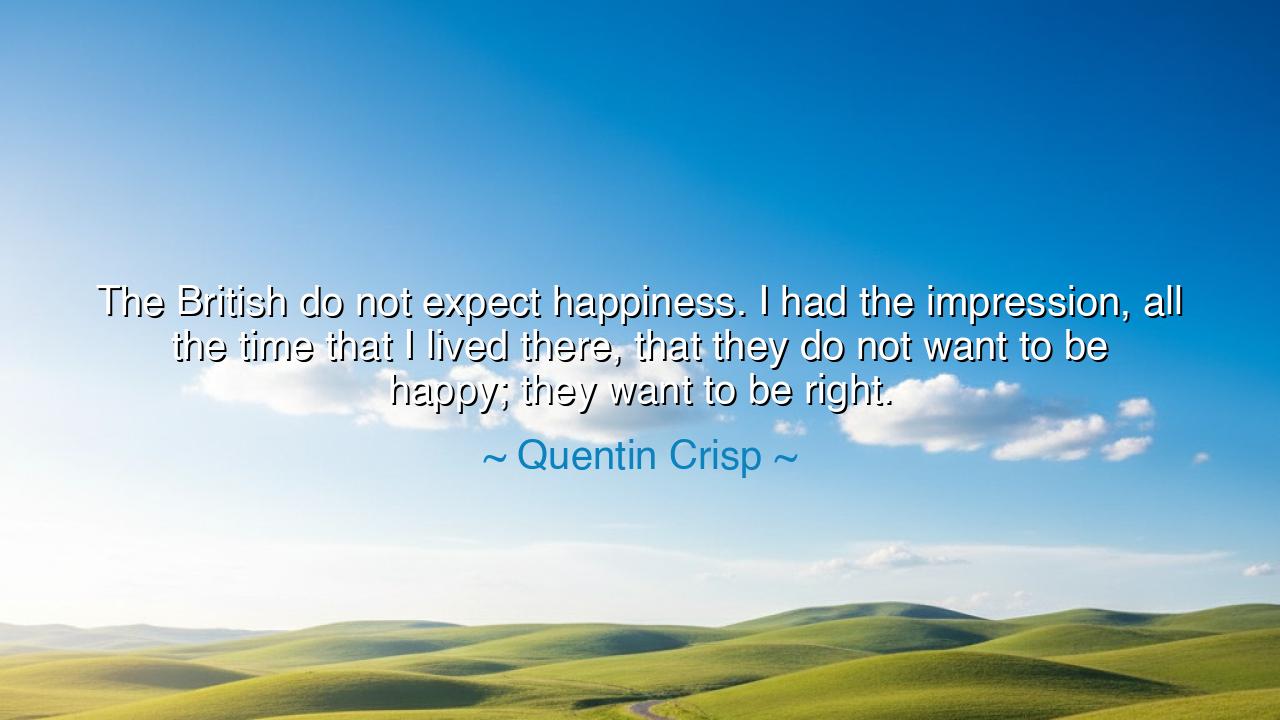
The British do not expect happiness. I had the impression, all
The British do not expect happiness. I had the impression, all the time that I lived there, that they do not want to be happy; they want to be right.






“The British do not expect happiness. I had the impression, all the time that I lived there, that they do not want to be happy; they want to be right.” — Quentin Crisp
In these sharp and sorrowful words, Quentin Crisp, the brilliant iconoclast and observer of the human spirit, captures a truth not merely about a people, but about a condition of the modern soul. When he says that the British do not expect happiness, he speaks also of a wider ailment — the tendency of humankind to trade joy for correctness, to prefer the cold comfort of being right to the living warmth of being happy. For to be right is to dominate the mind of others; to be happy is to master one’s own heart. And how many, through pride or fear, choose the former over the latter?
In the age of iron certainty, men began to worship opinion more than peace. They sought to prove themselves in arguments, to cling to righteousness even when it cost them love or laughter. The British temperament, as Crisp saw it, became a mirror for this broader human struggle — stoic, restrained, dignified, yet often afraid of joy’s vulnerability. To want to be right is to guard the self; to want to be happy is to open it. Perhaps, in their measured hearts, they feared that happiness, being wild and unpredictable, would strip them of control. Thus, they built fortresses of intellect and irony, walls of wit and restraint — but within those walls, warmth was often imprisoned.
Yet happiness, as the ancients taught, is not the fruit of correctness but of harmony. The Greeks called it eudaimonia — the well-tuned soul, in balance with life’s music. To live always in pursuit of being “right” is to fight against the flow of existence; to live in pursuit of happiness is to move with it. The one seeks victory; the other seeks peace. When Quentin Crisp observed the British desire for rectitude, he was not mocking — he was lamenting. He saw a people who valued truth but forgot that truth without joy becomes a burden too heavy to bear.
Consider Bertrand Russell, a philosopher born of that same island, who spent his long life wrestling with logic and reason. Yet in his old age, when asked for the secret of happiness, he did not speak of proofs or principles. He said, “The secret of happiness is to face the fact that the world is horrible, horrible, horrible — yet not to be crushed by it.” Even he, master of intellect, learned that being right brings little comfort if it is not balanced by the courage to seek joy despite imperfection. He discovered that wisdom lies not in the conquest of truth, but in the acceptance of life’s beauty even amid its flaws.
There is a strange pride in misery, a dark satisfaction in believing oneself too wise to be happy. Many wear unhappiness as a mark of depth, thinking that to be joyful is to be naive. But this is folly. Happiness is not ignorance; it is strength. It takes far greater courage to remain open-hearted in a cold world than to retreat into superiority. Those who cling to being right may win arguments — but they lose the quiet radiance of life. They may stand unchallenged — but they stand alone.
To be right is often to harden; to be happy is to soften, to bend, to forgive. The river that bends reaches the sea; the rock that resists breaks upon itself. The wise of every age — from Lao Tzu to Marcus Aurelius — have taught that peace cannot dwell in the soul that always demands to be correct. True joy comes from humility, from the freedom to say, “Perhaps I do not know everything. Perhaps what matters is not victory, but love.”
So let this teaching be passed down, O seeker of peace: Do not strive always to be right; strive instead to be kind, to be free, to be happy. For correctness may fill the mind, but only joy can nourish the heart. When the choice arises — and it will, again and again — between defending your pride or preserving your peace, choose peace. Practice the art of yielding, the grace of laughter, the courage of gentleness. For the world does not remember those who were merely right; it remembers those who, in their warmth and wonder, reminded others how to live.






AAdministratorAdministrator
Welcome, honored guests. Please leave a comment, we will respond soon